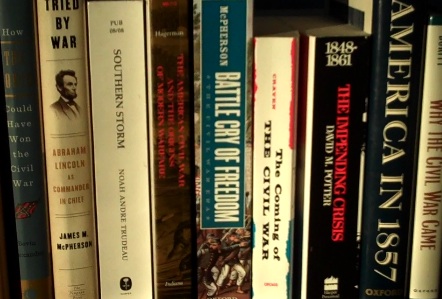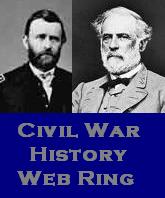Archive for December 30th, 2007
Good Discussion on the Inevitability of the Civil War
The final post of my series Exploring Causes of the Civil War (which you can read here) titled “The Debate Over the War’s Inevitability,” has spawned some interesting debate over both the inevitability of the Civil War and the idea of “inevitability” itself. Blogger Elektratig not only provides some insightful comments to my post, but expounds upon those in a post titled “Historical Inevitability” on his own blog here. He provides a good argument that rather than “inevitability,” we should speak of “probability.”
John Maass (a fellow wordpress.com blogger at A Student of History) enters the discussion with the assertion that looking at historical events as “inevitable” is amateurish history (see comments on both my original post and on Elektratig’s) and is particularly dangerous in the field of military history because of the contingencies that can come into play during war.
It promotes a teleological view of history that is simply far too unsophisticated and “cookie cutter” for an accurate look at the past. Anyone can go back into the chronicle of the past and see lots of events and add them all up to “prove” that a subsequent event was inevitable or foreordained. Historians don’t do this, or at least they shouldn’t.
“Teleologic” comes from the noun “teleology” which has to do in the philosophical sense (as I believe John intended it) with the explanation of phenomena by the purpose they serve rather than by postulated causes. In the theological sense, it refers to the doctrine of design and purpose in the material world.i
 Both meanings I find interesting in that, as I mentioned in my last post, I’m preparing a research proposal to study the impact of historian George Bancroft on 19th century historiography. Bancroft has been criticized for his views about America’s destiny being pre-ordained. Frank Freidel captured it well in his work, The Golden Age of American History.
Both meanings I find interesting in that, as I mentioned in my last post, I’m preparing a research proposal to study the impact of historian George Bancroft on 19th century historiography. Bancroft has been criticized for his views about America’s destiny being pre-ordained. Frank Freidel captured it well in his work, The Golden Age of American History.
Bancroft saw a divine shaping of American destinies, from the founding of the individual colonies through the successful culmination of the struggle for independence, and beyond to his own day. He wrote in his preface in 1834, “It is the object of the present work to explain how the change in the condition of our land has been brought about; and, as the fortunes of a nation are not under the control of blind destiny, to follow the steps by which a favoring Providence, calling our institutions into being, has conducted the country to its present happiness and glory.”ii
As the new “scientific history” began to emerge, this position received considerable challenge.
My thanks to both commenter’s for their excellent discussion.
Photo above of Creation of the Sun and Moonby Michelangelo, face detail of God. (Source: Wikimedia Commons, public domain).
i Oxford Pocket American Dictionary of Current English, (New York: Oxford University Press, 2002), 835.
iiFrank Freidel, The Golden Age of American History [book on-line] (New York: G. Braziller, 1959, accessed 30 December 2007), 70; available from Questia, http://www.questia.com/PM.qst?a=o&d=4419028; Internet.














































